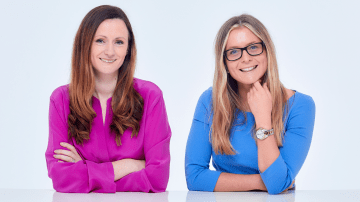Continuing our World WellBeing At Work Week, kindly sponsored by Deloitte LLP, today Catherine Dennison and Louise Dennison O’ Shaughnessy of the Dennison Training Academy discuss how it is possible to overcome an inbuilt negativity bias to become happier and more productive.
Why is it that one particular negative comment made when you were a child still haunts you and the thousands of positive comments that you have likely heard over the course of your lifetime, you can’t remember?
There is a perfectly logical explanation discovered and explained by evolutionary biologists, that once you become aware of, has the power to change your mind and change your life! We all have an inbuilt negativity bias. Why?
To understand the negativity bias we first need to go back in time to our ancestors.
Our ancestors’ survival depended on them being on high alert for all threats, scanning their environment all the time for anything that could result in imminent death. They had to avoid predators, starvation and aggression from others. These life-threatening factors have become known as ‘sticks’. They were also motivated to get things that were pleasurable, such as food, shelter and sex, known as ‘carrots’.
In the book ‘Hardwiring Happiness’ neuroscientist Rick Hanson ventures an explanation, endorsed by many other researchers, about the origin of the evolutionary nature of this negativity bias. According to Rick Hanson: “From a survival standpoint, sticks have more urgency than carrots. If you fail to get a carrot today, you’ll have another chance to get one tomorrow, but if you fail to avoid a stick today – whap! – no more carrots forever.”
So over time, the brain structure adapted very slowly to pay more attention to negative information, rather than positive. It was literally a matter of life or death. A matter of survival. To survive another day.
One example of this in modern day life is our fear of rejection.
Just think of how you experience rejection; many people’s fear of rejection far exceeds anything that is rational. Think about your own feelings in relation to rejection, do the feelings really reflect the impact of the experience? Why do we have such a visceral reaction to rejection, like we are dying from the inside out.
Well in the past, our ancestors’ lives did depend on their ability to avoid rejection. To be rejected from your clan or tribe did mean a certain death. To understand this, can help change the dialogue around this experience for this fear no longer serves us. It is time to adapt and change our thinking to reflect the new world we live in.
Other everyday areas where you might feel the results of this bias include your relationships, the way you perceive others and your decision making. The consequences are far reaching.
Our brain has evolved over billions of years. It is wired to pay more attention to the negative to help you survive. Just knowing that this is the nature of our mind and understanding why, will eliminate more destructive thoughts. Instead of wondering ‘why am I like this?’, one can start to identify the negative thoughts and understand and appreciate where they have come from. This is how my brain is wired, as opposed to ‘there is something wrong with me’.
Our thoughts are real but not always true. Awareness and observation are the first steps in being able to change. Awareness of the negativity bias creates a choice. We can choose to combat those thoughts that no longer serve us or at the very least not let them dictate our actions. Over time the less you listen to old destructive thoughts, the less power they have over you. We can develop new healthier ways of engaging with the world and the people in it.
We can choose to “change the CD” (this is a teaching from Thich Nhat Hanh) by changing the focus of our attention. We can replace the CD playing in our head to a more positive one. 
The antidote to the negativity bias is a conscious change of narrative. Challenge old destructive thought patterns. Slowly, consciously create and engage with new more reflective thought patterns that serve you. Your thoughts are creative so pay attention.
If you can raise somebody’s level of positivity in the present, then their brain experiences what we now call ‘the happiness advantage.’ When your brain is in this state, it performs significantly better than when in a negative, neutral, or stressed state. Your intelligence rises, your creativity rises, and your energy levels rise.
In fact, research according to the New York Times bestselling author of ‘The Happiness Advantage’ Shawn Achor states that every single business outcome improves. Your brain when in positive mode is 31% more productive. You’re 37% better at sales. Doctors are 19% faster and more accurate at coming up with the correct diagnoses.
We can train our brains, just like we can train our bodies.
As Rick Hanson put it: “Use your mind, to change your brain, to change your mind for the better. Bit by bit, synapse by synapse, you can really build happiness into your brain.”
Just think of the benefits in the workplace, of your performance and those around you, and the relationships you enjoy.
Think about it.

Catherine Dennison is a Director and Partner of the Dennison Training Academy. She is an Advanced Mental Health Instructor; FAR Instructor; BA Mathematics & Statistics; Dip. Training and Development IITD; Dip. Applied Psychology.
Louise Dennison O’ Shaughnessy is Founder & Principal of the Dennison Training Academy. She is an Advanced Mental Health Instructor; First Aid Instructor; Registered EMT; Dip. Training and Development IITD; BSc; P.G Dip (Business & Management)

The Dennison Training Academy is passionate about people & health and wellbeing. It has a specially designed suite of Mental Health Courses to equip learners with an awareness of mental health, and with the knowledge and skills to work with individuals with mental health problems. The Dennison Training Academy changes beliefs and behaviours about Mental Health and Wellbeing in the workplace. All in-person and distance learning First Aid for Mental Health Courses offer Internationally Regulated and Accredited Qualifications.

Deloitte in Jersey delivers audit, accountancy, tax, financial and risk advisory and business consulting and transformation services to many leading businesses in the jurisdiction and beyond.
Deloitte’s approach combines insight and innovation from multiple disciplines, with business and industry knowledge, to help their clients excel. Jersey is part of Deloitte’s Islands & Gibraltar team which offers a single audit and advisory offering across the four jurisdictions and is integrated with the wider Deloitte UK and North South Europe network.
To get in touch, please email our central mailbox, Siobhan Durcan or Jordan Stott.















